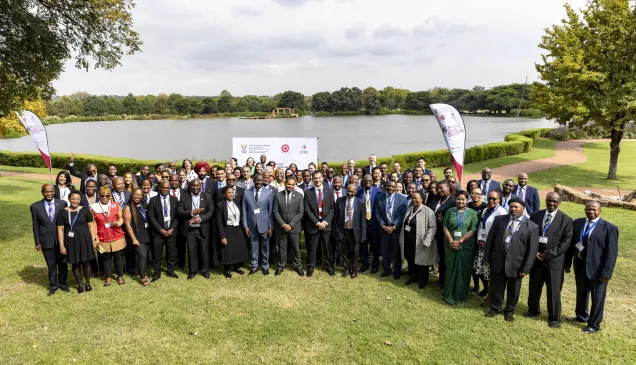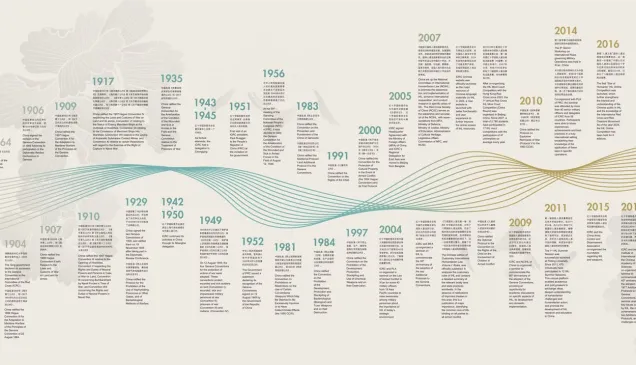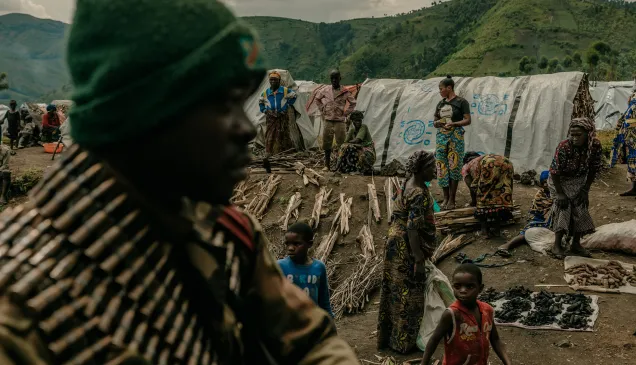Afghanistan: Facts and figures – January to September 2015
The ICRC's work in Afghanistan focuses on visiting detainees to monitor their lives conditions and treatment, providing basic aid and medical care, improving access to water and sanitation, reconnecting families separated by ongoing conflict, and working in collaboration with the Afghan Red Crescent Society.
Below is an overview of the ICRC's work in Afghanistan from January to September 2015.
Visiting detainees and maintaining family contact
- Carried out 79 visits in nearly 30 detention centres (housing over 26,000 detainees)
- Followed up with more than 1,500 people arrested in relation to the conflict, of whom 691 were visited for the first time and registered
- Helped 44 released detainees to travel home
- Collected over 2,000 Red Cross messages between detainees and their families and distributed more than 1,900 messages, with support from the Afghan Red Crescent Society
- Helped families of detainees in the Afghan National Detention Facility to re-establish and maintain contact with their relatives through more than 4,000 phone calls and 3,350 family visits
- Organized 23 family visits for detainees held in Pul-i-Charkhi prison
- Received nearly 140 queries from families about arrested or disappeared relatives and 257 tracing requests from abroad, of which 116 were successfully resolved
- Facilitated the transfer of 1,637 remains of fighters and civilians to their families
*Numbers are only from January to August
Supporting health care
- Supported Mirwais and Sheberghan Hospitals, which admitted over 49,000 patients to their surgical, medical, obstetrics and gynaecology wards, and carried out more than 15,000 surgical operations and 319,000 outpatient consultations
- Provided monthly medical and other supplies to the Koringal Sub-Health Centre in Kunar
- Made 183 visits to assess the health of detainees in Sarpoza prison in Kandahar and Herat Provincial Prisons
- Provided technical and financial support and medical supplies to 47 Afghan Red Crescent clinics and community-based health and first-aid volunteers, of which the clinics conducted over 732,000 outpatients consultations and administered approximately 392,000 doses of vaccine for routine childhood diseases and polio
- Transported more than 1,450 people wounded to medical centres
- Trained 726 persons in direct contact with wounded people
- Carried out engineering activities to improve the conditions for patients and staff at Mirwais Regional Hospital and Shebergân Provincial Hospital, contributing to a reduction in patient mortality and morbidity
- Continued construction work on the new laundry at Mirwais Regional Hospital, and completed technical designs and tendering for the renovation of the paediatric and neonatal department
- Completed feasibility study and preliminary designs for the construction of a new emergency ward at Shebergân Provincial Hospital
- Installed perimeter wall around the newly constructed physical rehabilitation centre (PRC) in Faizâbâd, improving service provision – as a first approach to passive protection measures for the premises (respecting technical standards for areas prone to earthquakes)
- Continued works to complete new central heating system at the physical rehabilitation centre (PRC) in Kabul – four additional main buildings and seven ancillary spaces were connected to four boiler rooms
Providing limb-fitting and physical rehabilitation services
- Registered over 6,900 new patients, of whom 918 were amputees
- Assisted nearly 100,000 patients in the seven ICRC prosthetic / orthotic centres
- Made more than 14,000 prostheses and orthoses
- Provided nearly 197,000 physiotherapy treatments to patients
- Granted micro-credit loans to 447 patients to start their own small business ventures
- Facilitated vocational training of 537 patients; of which 135 graduated in 2015
- Made over 6,200 home visits, assisting nearly 4,900 patients with spinal cord injuries and training their families
Providing basic aid
- 89,000 people received basic aid, such as blankets and hygiene kits, in partnership with the Afghan Red Crescent Society
- 1,000 people benefitted from cash-for-work projects, which has improved infrastructure such as irrigation channels, protection walls and water gates
- 15 cash-for-work projects were completed, enabling households to better protect and cultivate their land, and increase their food production and income
- 154 households (approximately 1,680 individuals) received cash assistance for emergency medical treatment and funeral expenses for family members injured or killed in the conflict
- 25 vulnerable women-headed households in Farah province received 25 chickens (one rooster and 24 hens), a feeder and other equipment, and training on good poultry management practices, helping to increase their income
- 23 workers received basic veterinary kits and training on animal health services, helping improve the health and productivity of the animals, and increase food production
- 86 ICRC-supported para-veterinarians received drugs, helping them de-worm and treat farm animals against different diseases, and improve the health and productivity of these animals
- 330 nomad pastoral farmers attended livestock training, learning how to better manage and protect their animals – farmers also received concentrated animal feed and basic tools
Improving water and sanitation services
- Enabled 190,000 people to access to water for household needs in rural areas of Badghis, Balkh, Paktia, Bamyan, Daykundi, Ghazni, Kapisa, Khost, Nangarhar, Parwan, Herat, Farah and Faryab provinces
- Completed the construction of new visitor shelters at the Pul-e-Charkhi Central Prison (housing approximately 8,500 detainees)
- Improved access to water facilities for over 4,400 detainees in Pul-e-Charkhi Central Prison
- Improved general facilities at Balkh and Herat Provincial Prisons, from which around 4,000 detainees benefited
- Completed new extension to the physical rehabilitation centre in Lashkar Gah, where more than 40 employees living with disabilities and 100 patients (and relatives) receive daily treatment
- Completed technical designs for the improvement of the water supply system in Farâh Provincial Prison (housing approximately 750 detainees)
- Commenced feasibility study for the wastewater treatment system in Hérât Provincial Prison
- Distributed hygiene items benefiting approximately 36,900 individuals, of whom nearly 85% are detainees
- Completed renovation and construction works at the Kunduz Provincial Prison – works are on-going in Hérât, Kâbul, and Jawzjan Provincial Prisons
- Finalized technical designs for a family visitor building extension at the Afghan National Detention Facility in Parwân (required due to a dramatic increase in the number of detainees)
Working in partnership with the Afghan Red Crescent Society (ARCS)
- Commenced work on eight activities and projects in the areas of health, family assistance, restoring family links and emergency preparedness, based on the signed partnership framework agreement (2015 – 2017) and a commitment on the joint delivery of humanitarian assistance
- Conducted a midterm review of the operational plan tracking progress towards achieving planned results – participants included representatives of the International Federation of the Red Cross and Red Crescent Societies (IFRC), the Canadian Red Cross and the ICRC
- Held an orientation session about the International Red Cross and Red Crescent Movement's history and Fundamental Principles for the Afghan President's representative who will facilitate all ARCS-related affairs with the Afghan President (patron of the ARCS)
- Reviewed the Strategic plan (2012-2015) and specified the Mission, Vision and Value Statement for the new Strategic plan (2016-2020) – participants included representatives of the International Federation of the Red Cross and Red Crescent Societies (IFRC), ICRC, UN and Government Emergency and Respond Committee
- Shared valuable information and experiences on emergency preparedness and response with the Central Asian National Societies in Tajikistan, Turkmenistan, Kyrgyzstan and Kazakhstan during a peer to peer meeting (in Dushanbe, Tajikistan)
Promoting compliance with international humanitarian law (IHL)
- Conducted briefings to more than 25,400 people on IHL, including civil society members, community elders, religious scholars, political authorities, members of the national army, national police, local police units, National Directorate of Security, armed opposition and people receiving ICRC assistance
Learn more about the ICRC's work in Afghanistan



